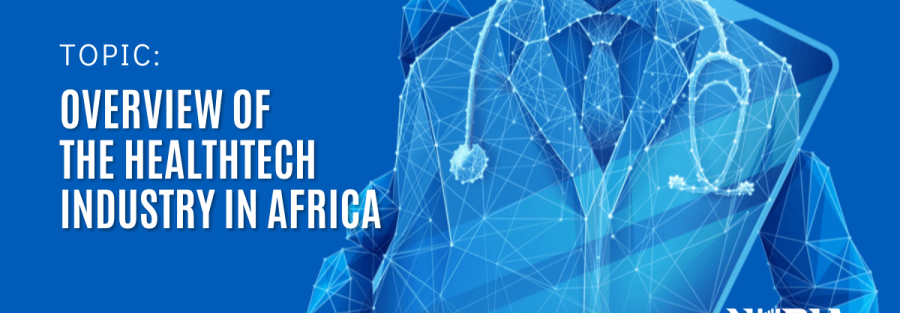Nubia Capital
We are committed to investing in tech-enabled startups across Africa and helping founders grow extraordinary businesses.
Published Nov 16, 2023
Man the problem, Man the solution.
Health x Technology.
The use of technology to strengthen health care systems, to develop technologies that improve the health sector or/and to transform the healthcare landscape in Africa. The Healthtech industry in Africa is a movement whose aim spuns beyond Telemedicine i.e remote healthcare. It also expands to healthcare delivery, healthcare financing, healthcare accessibility.
There are several challenges that face the healthcare sector in Africa today. Research conducted at the African Epidemiological Association Annual Meeting in Maputo identified the top problems of the healthcare sector in africa which include poor resource allocation to health, poor maintenance of healthcare system infrastructure, weak healthcare systems, lack of access to healthcare, healthcare workforce shortages, lack of political will, weak healthcare management information systems (HMIS) and non-prioritization of healthcare activities. How many of these can be solved with technology? Maybe one, maybe all? Let’s pick a few.
The use of technology to address healthcare workforce shortages
In the training conducted by the afro listed organisation, inadequate human resources for health was a major challenge in the health industry. As part of the solutions, the six WHO health system building blocks were highlighted which include leadership and governance (31.8%), healthcare workforce (31.8%) and healthcare financing (21.50%) with the rest covered by service delivery, healthcare information systems and access to medicines and technologies.
Inadequate human resource and shortage of healthcare workers is a great challenge in the industry with countries falling below the recommended quota by WHO. Using Nigeria as an example, the Nigerian healthcare workforce, including doctors, nurses, and pharmacists have always been known to emigrate to developed countries to practise. A national statistical report published in August 2022 by the UK government revealed that 13,609 healthcare workers have left Nigeria for the UK between 2021 to 2022.
Healthcare startups are creating solutions that enable healthcare workers to work better, faster and more effectively. Mdaas is a startup providing modular diagnostic centres to healthcare providers in underserved areas. These centres are equipped with state-of-the-art diagnostic equipment and are staffed by trained healthcare professionals. MDaaS Global also offers training to healthcare workers to ensure they can use the equipment effectively. Solving this challenge is also Ilara health. Founded at the start of 2019, Ilara health equips a network of small healthcare providers with lifesaving and essential diagnostic tools to improve the quality of medical care in Sub-Saharan Africa. A key problem we solve for these clinics is the lack of accessibility to traditional financing typically used by SMEs to support their growth. The clinics are then able to develop their businesses and offer quality healthcare through revenue-generating diagnostic assets
Lack of access to healthcare and Failure of healthcare delivery in Africa
Raymond O, President of Health for Schools and Communities Foundation Inc, California Extensively described the repercussions of poor healthcare delivery in Nigeria. He mentioned that while many countries such as China, Cuba, Chile and the US have improved their health care services to fit the population needs, access to primary healthcare in many African countries is highly limited thereby leading to increased death and diseases from preventable causes. According to him, most healthcare systems in Africa are not designed from the ground up to respond to local needs but were either copied or adapted from the colonial governments and such health systems are inherently unresponsive to changing health needs of the adopting countries.
He alsdo expanded on this inherently discriminatory system saying that the system catered to health needs if cicil servants who worked for the colonial governments officials who were not white. Regrettably, its discriminatory approach denied healthcare to less privileges and those living in rural and remote areas .
One of those technologies creating solutions in healthcare delivery is the Electronic health records (EHRs) systems which enable healthcare providers to access patient health records in real-time, enabling them to make informed decisions about patient care.
Helium Health established in 2016 is a company that has dedicated their solution to EHR technology. They offer a cloud-based electronic health record (EHR) system. The system also allows healthcare providers to manage patient information and medical records more efficiently. It also offers patients a digital platform to schedule appointments, receive test results, and access medical information.
Mpharma also creates access to medicine with their health technology. Based in Ghana, mPharma aims to improve access to essential medicines by working with hospitals and pharmacies to reduce drug prices.
Telemedicine is a technology transforming the way medical services are delivered, particularly in remote and underserved areas.
With the advent of technology and telecommunications, healthcare can be delivered effectively and accessed by the rural population. One of those technology companies is Hello Doctor.
Hello Doctor is a South African telemedicine startup making healthcare more accessible and affordable. The startup offers a mobile app that allows users to consult with doctors via text or video chat. Users can also access various health services, including medication delivery, health assessments, and health coaching. Hello Doctor’s platform is particularly useful in rural areas with limited access to healthcare.
Poor Healthcare Financing
Healthcare in Africa still needs heavy financing. Africa is fortunate to have a range of venture capital; companies and angel investors pouring in millions of dollars to create viable and useful healthcare solutions through technology for Africans.
Some of them include Nubia Capital. Nubia Capital is a venture capital firm with strict social, impact and ethical strategy investing. Nubia Capital is addressing critical, societal challenges, empowering local communities and creating long-lasting change. In healthcare, Nubia Capital is supporting health techs for better healthcare delivery and accessibility.
Conclusion
Man the problem, Man the solution. Man is experiencing several problems which were as a result of man’s choices.
Today, through technology and innovation, Man is solving those problems by those same choices.

Enjoyed discussing the African startup ecosystem? Share with friends, colleagues and teammates!




